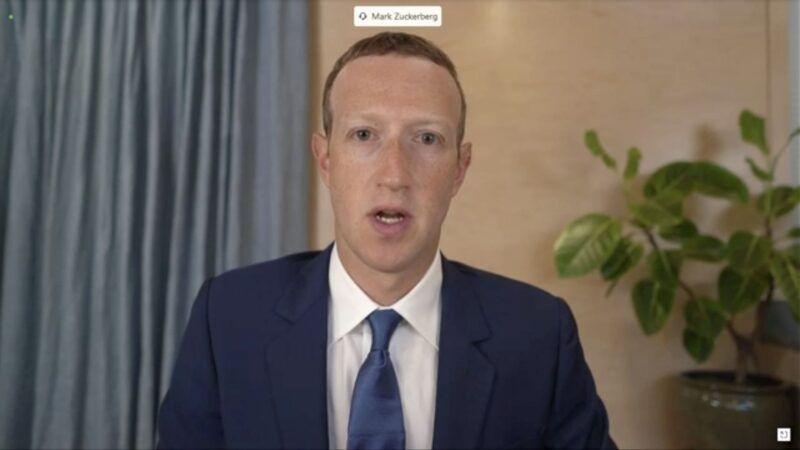Perhaps Facebook Supports Section 230 Reform Because It Could Make Big Tech Even More Powerful
Even minor tweaks to the law could shore up Mark Zuckerberg's dominance.

Another day, another congressional hearing on the badness of Big Tech: Facebook CEO Mark Zuckerberg, Twitter CEO Jack Dorsey, and Google CEO Sundar Pichai are set to testify Thursday on the role of social media in spreading political extremism and misinformation.
During his previous appearances on Capitol Hill—both virtually, and in person—Zuckerberg has signaled a willingness to accept some federal regulation of his platform. In his forthcoming testimony, Facebook's chieftain will go further, explicitly suggesting that Congress update "the rules of the internet": i.e., Section 230, the federal statute that grants social media companies protection from liability for third-party content that appears on their sites.
Section 230 is foundational to the internet because it allows websites to grant users broad freedom to post at will, without having to worry that the platforms themselves will face lawsuits. But it has recently come under attack from both the left and the right: Republicans think social media companies are biased against conservatives and that taking away their Section 230 privileges would constitute a suitable punishment; Democrats think social media companies don't moderate content aggressively enough and eliminating their liability protection would push them to do more.
"I believe that Section 230 would benefit from thoughtful changes to make it work better for people, but identifying a way forward is challenging given the chorus of people arguing—sometimes for contradictory reasons—that the law is doing more harm than good," notes Zuckerberg in his testimony.
Zuckerberg's proposal is to make Section 230 protection conditional on platforms demonstrating that "they have systems in place for identifying unlawful content and removing it."
"Platforms should not be held liable if a particular piece of content evades its detection—that would be impractical for platforms with billions of posts per day—but they should be required to have adequate systems in place to address unlawful content," he writes. "Definitions of an adequate system could be proportionate to platform size and set by a third-party."
Those are important qualifiers that need considerable elaboration. For once, it might actually be useful to hear members of Congress grill Zuckerberg on this, because requiring social media companies to jump through hoops in order to earn Section 230 protection could actually devolve to Facebook's advantage.
Why? Well, Facebook is large and powerful, and employs an army of content moderators. They already have robust moderation systems in place for identifying and taking down unlawful content. Any upstart rival company could struggle to build the infrastructure necessary to fulfill such requirements. Even Twitter—which is Facebook's closest rival—does not employ nearly as many content moderators as Facebook. A proposal to make all large social media companies complete a series of tasks in order to win back Section 230 protection could actually be a proposal to secure Facebook's advantage over Twitter.
It's also important to ask what authority would be in charge of ensuring that social media companies maintained "adequate systems" for moderating unlawful content. Presumably this would be some government agency or commission. This, too, could be a boon for Facebook, which after all is better positioned to lobby people in positions of power. (Indeed, there are senior Facebook executives who formerly served as staffers for members of Congress and Parliament.)
Tech skeptics should not get suckered into thinking that regulation is the answer just because Zuckerberg supports it. Republicans who are wary of political bias on social media should keep in mind that stripping the platforms of their 230 protection is likely to result in more "censorship" of conservative content rather than less, and Democrats should consider how Zuckerberg's proposed reforms might further entrench the most powerful players.


Show Comments (92)